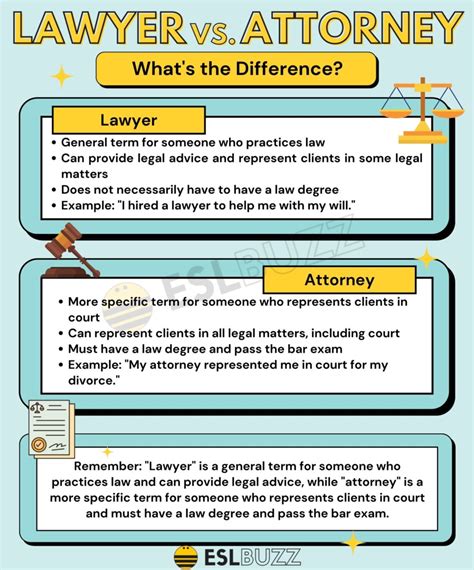
Salutations, Readers!
Welcome to our in-depth guide on the distinction between an attorney at law and an attorney in fact. These two terms, though similar in name, carry vastly different meanings and implications in the legal realm. Understanding the nuances between the two is crucial for navigating legal matters effectively.
Clarifying Legal Roles and Terminology
Attorney at Law: The Legal Professional
An attorney at law, commonly known as a lawyer, is a licensed legal professional who has undergone rigorous training and passed the bar examination in a particular jurisdiction. They possess the knowledge, skills, and authority to provide legal advice, represent clients in court, and draft and review legal documents. Attorneys at law are bound by ethical and professional standards to act in the best interests of their clients.
Attorney in Fact: A Trusted Agent
An attorney in fact, also referred to as a power of attorney, is an individual who has been legally authorized by another person (the principal) to act on their behalf in specific matters, such as financial transactions, medical decisions, or property management. The principal grants the attorney in fact written instructions outlining the scope of their authority. Attorneys in fact do not require legal training or licensing.
Understanding the Key Differences
Scope of Authority
The primary difference between an attorney at law and an attorney in fact lies in their scope of authority. An attorney at law possesses a broad range of legal powers and can represent clients in all aspects of legal matters. An attorney in fact, on the other hand, has limited authority that is strictly defined by the power of attorney document.
Legal Training and Licensing
Attorneys at law undergo extensive legal training and must pass the bar examination in order to practice law. Attorneys in fact do not require any formal legal education or licensing.
Representation in Court
Attorneys at law have the exclusive right to represent clients in court proceedings. Attorneys in fact cannot appear in court on behalf of their principals unless specifically authorized to do so by the court.
Fiduciary Duty
Attorneys at law are bound by a fiduciary duty to act in the best interests of their clients. Attorneys in fact owe a similar duty to the principal who appointed them.
Comparative Table: Attorney at Law vs. Attorney in Fact
| Feature | Attorney at Law | Attorney in Fact |
|---|---|---|
| Legal Training | Required | Not Required |
| Licensing | Required | Not Required |
| Scope of Authority | Broad, legal matters | Limited, as per power of attorney |
| Representation in Court | Exclusive | Only if specifically authorized |
| Fiduciary Duty | Yes | Yes |
Conclusion
Distinguishing between an attorney at law and an attorney in fact is essential for effectively managing legal affairs. Attorneys at law provide professional legal guidance and representation, while attorneys in fact serve as trusted agents with limited authority. Understanding this distinction empowers you to make informed decisions when seeking legal assistance.
For further exploration into related legal topics, please visit our other articles:
- [Understanding Legal Contracts]
- [The Role of the Paralegal]
- [Alternative Dispute Resolution]
FAQ about Attorney at Law vs Attorney in Fact
1. What is an attorney at law?
An attorney at law, also known as a lawyer, is a professional licensed to practice law in a specified jurisdiction. They have completed law school, passed the bar exam, and are authorized to represent clients in legal matters.
2. What is an attorney in fact?
An attorney in fact, also known as a power of attorney, is a legal document that grants specific powers to another person (the "attorney-in-fact") to act on behalf of the person granting the power (the "principal"). The attorney-in-fact can handle various tasks, such as financial transactions or healthcare decisions.
3. What are the key differences between an attorney at law and an attorney in fact?
Attorneys at law are licensed professionals with specialized legal training, while attorneys in fact are not required to have legal expertise. Attorneys at law can represent clients in court and provide legal advice, whereas attorneys in fact are limited to specific tasks outlined in the power of attorney document.
4. Can an attorney in fact hire an attorney at law?
Yes, an attorney in fact can hire an attorney at law to represent the principal in legal matters on their behalf.
5. Does an attorney in fact have the same authority as an attorney at law?
No, an attorney in fact only has the authority specifically granted in the power of attorney document. They do not have the general legal knowledge or the right to practice law like an attorney at law.
6. Can an attorney at law be an attorney in fact?
Yes, an attorney at law can also serve as an attorney in fact, but they are subject to the same limitations as any other attorney in fact.
7. Can I give an attorney in fact power over all my affairs?
Yes, you can grant an attorney in fact broad powers over your affairs, but it’s recommended to consult with an attorney at law to ensure the document is appropriately drafted and limits any potential risks.
8. Can I revoke an attorney in fact?
Yes, you can revoke an attorney in fact at any time by executing a revocation document.
9. What happens if an attorney in fact misuses their powers?
If an attorney in fact misuses their powers, the principal may have legal remedies, including revoking the power of attorney and seeking damages.
10. Should I choose an attorney at law or an attorney in fact for my needs?
The choice depends on your specific needs. If you need legal representation or advice, an attorney at law is the appropriate choice. If you need someone to handle specific tasks on your behalf, an attorney in fact can be a suitable option.



